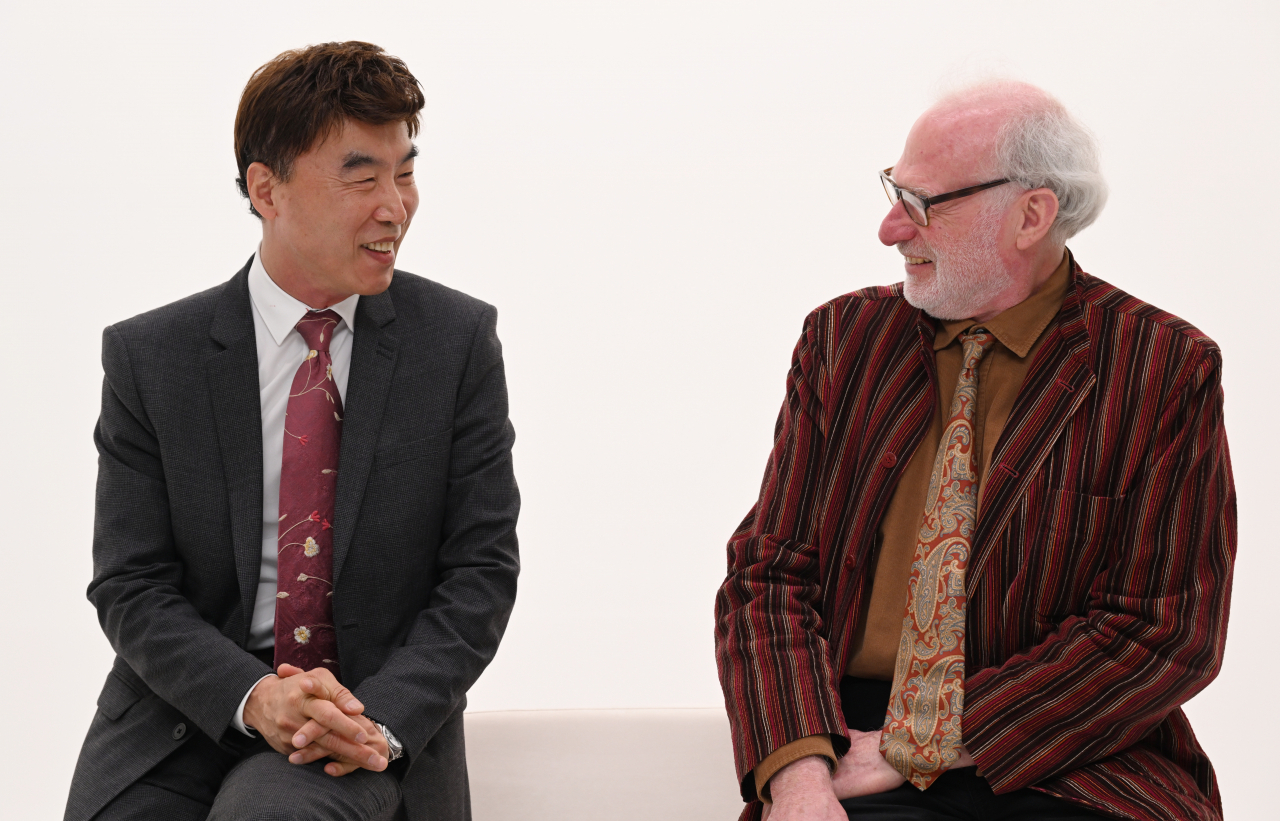 |
Park Jung-wook (left) and Regis Juvigny, co-presidents of the France-based K-Garden Association, speak to The Korea Herald at its headquarters in Seoul on March 22. (Park Hae-mook/The Korea Herald) |
The beauty and ecological value of Korean gardens will be featured in Paris in 2025 in a major exhibition with an estimated cost of 15 billion won ($11.5 million), the Korean-French duo in charge of the project told The Korea Herald.
Park Jung-wook and Regis Juvigny, co-presidents of K-Garden Association, said in Seoul last week that they are currently in the process of bringing their plan of showcasing the best aspects of Korean gardens in the Luxembourg Gardens in the heart of Paris.
“Japanese or Chinese gardens have a clear trail that the visitors have to walk through to enjoy the scenery. In contrast, Korean gardens require visitors to map out their own routes in their minds,” Park said.
“Problems with the ecosystem happen when humans start distinguishing themselves from nature – the Korean garden is a portrayal of humans becoming a part of nature,” he added.
Juvigny said the style of Korea's gardens, which has remained consistent for centuries, provides an important lesson for the world today, where we are facing issues that stem from rapid changes in the Earth’s inhabitants and their habitats.
“The species of plants in the traditional Korean gardens have remained naturally unchanged for centuries and this trait is the answer to environmental issues around the world,” Juvigny said.
“European countries must conduct thorough research of the Korean garden because of its centuries-old ecosystem that has been kept alive," he added.
The K-Garden Association was launched last year with the goal of researching the ways of adopting the benefits of Korean gardens to green projects in the European Union. Park and Juvigny assumed the inaugural co-chief roles on the request of the French Senate.
Prior to the organization’s launch, the two first met at the Luxembourg Gardens, the planned venue of the exhibition.
Park, a Korean gardens expert who graduated from the Faculty of Arts and Humanities at the University of Paris IV – Paris Sorbonne, and Juvigny, who graduated from the prestigious Ecole Nationale Superieure de Paysage after studying landscape architecture, clicked right away with their common love for gardens. The meeting also amplified Juvigny’s interest in Korean gardens.
“I first saw Korean gardens through Korean historical dramas. They painted the Korean gardens in a way where the palaces were in harmony with the mountains behind, which is very different from the gardens in Europe,” Juvigny explained.
Another key goal of the committee is to distinguish the beauty of Korean gardens from their more globally known counterparts through the exhibition.
“Many think of Japanese gardens when people bring up the topic of Asian gardens. But the roots of Japanese gardens, such as zen-style gardens, can be found in Korea,” Park said.
The 2025 exhibition in Paris will feature five gardens centered around five different styles of traditional gazebos. Each will be based on different periods throughout Korean history, including the Shilla Kingdom (57 B.C–676 A.D) and the Goryeo Dynasty (918-1392). A garden dedicated to Korea’s young generation – millennials and Generation Z – will be exhibited as well.
The exhibition in Paris will last six months before traveling to other cities, including Seoul in 2026 and New York in 2027.
“We want to reinterpret gardens as a public and open space that exists for all generations,” Park said.






![[Today’s K-pop] Blackpink’s Jennie, Lisa invited to Coachella as solo acts](http://res.heraldm.com/phpwas/restmb_idxmake.php?idx=644&simg=/content/image/2024/11/21/20241121050099_0.jpg)
